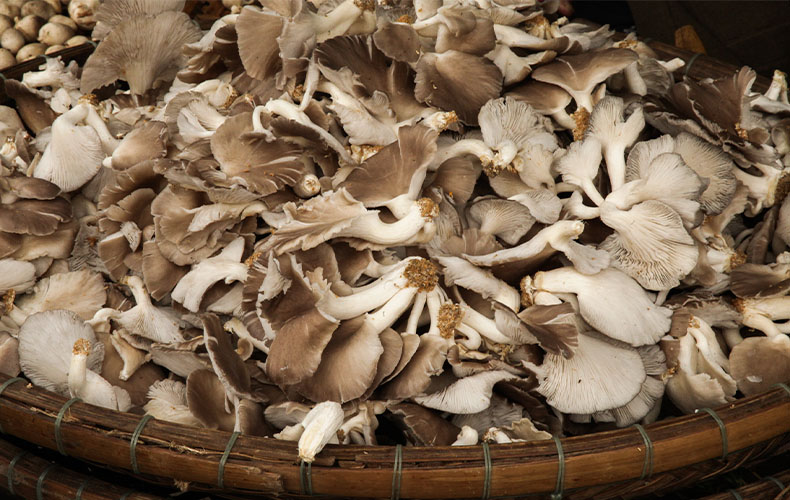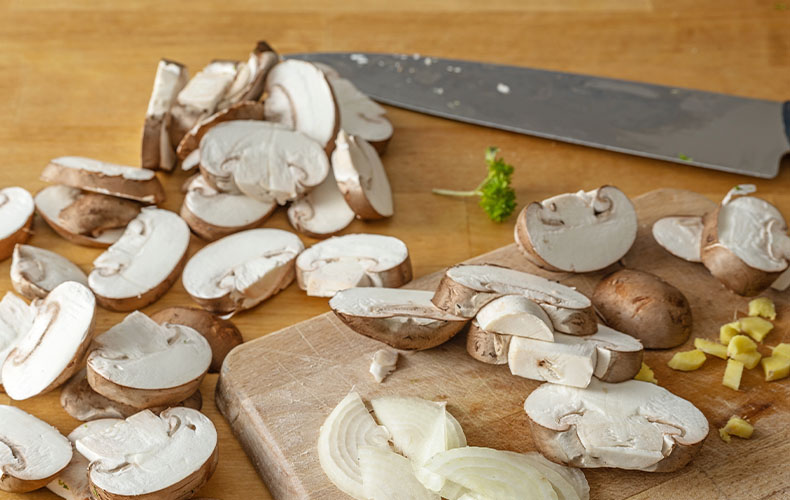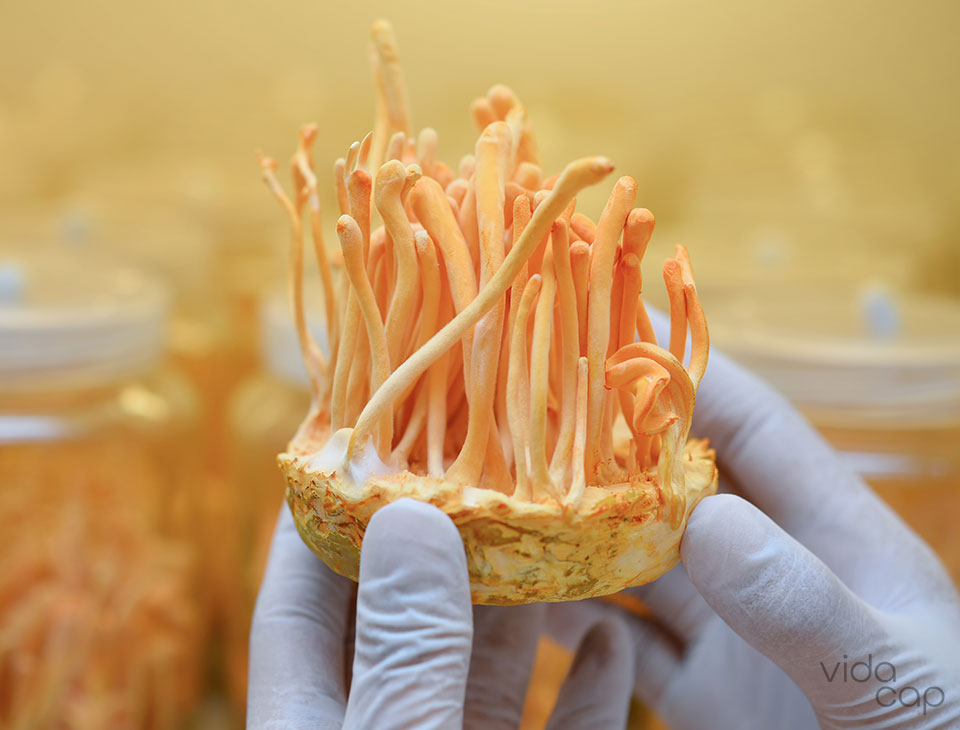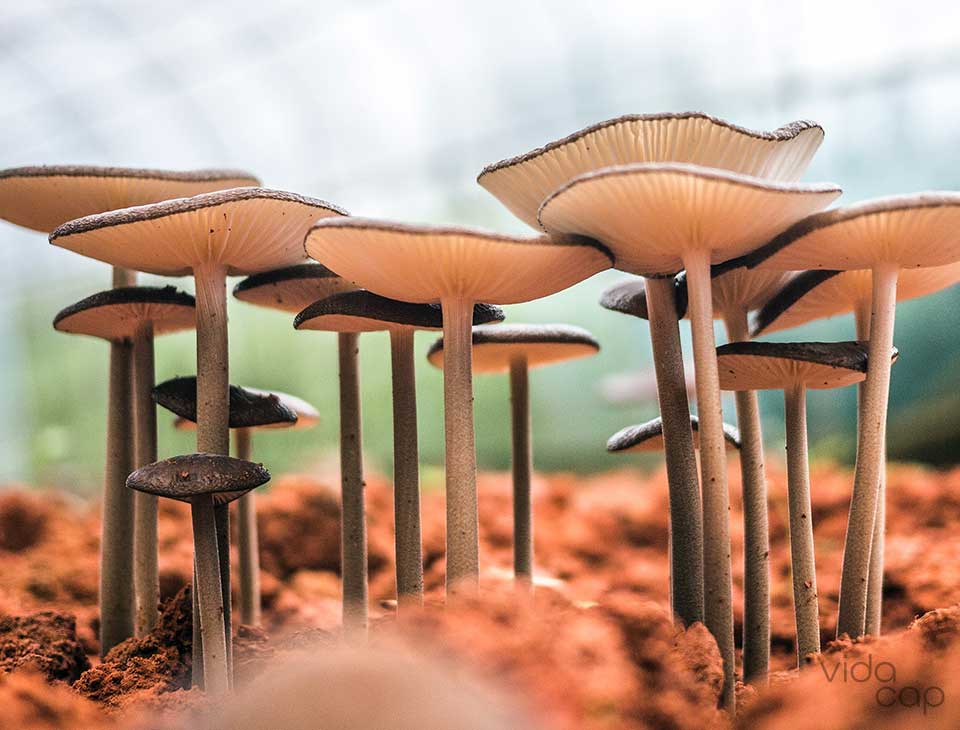
Are There Carbs in Mushrooms?
 Audrey Ferguson |
Updated on: February 20, 2024
Audrey Ferguson |
Updated on: February 20, 2024
Mushrooms are often consumed for their nutritional value as well as their distinctive flavor. They are low in calories, fat, and salt while being an excellent source of B vitamins, vitamin D, and several essential minerals.
Research has also shown that mushrooms could have therapeutic properties, including supporting immunity, improving gut health, and more. This makes them a valuable addition to any healthy and balanced diet.
However, some people may be concerned about how many carbohydrates are in mushrooms, especially those following low-carb diets.
The good news is that, although mushrooms do contain carbohydrates, they are not considered a starchy food. Therefore, they do not have the same effects as grains, potatoes, or beans. In fact, mushrooms contain some unique carbohydrates that may contribute significantly to their health benefits.
This article explains what you need to know about mushrooms and carbs, including the carb count of five common edible mushrooms. Read on to learn more.
Do Mushrooms Contain Carbs?
Mushrooms have a high water content, often around 90% or more. The remainder comprises protein, carbohydrates, traces of fat, vitamins, minerals, and other beneficial micronutrients.
So, the simple answer to the question “do mushrooms have carbs?” is “yes.” However, it is important to understand that not all carbohydrates are the same.

The word “carbohydrate’” can be used to describe any member of a large group of organic molecules consisting of carbon, hydrogen, and oxygen. These compounds can be further subdivided into sugars, starches, and dietary fibers.
Sugars are simple carbohydrates, including glucose and fructose. The body can easily absorb these molecules and rapidly convert them into energy. This is why eating high-sugar foods often causes an energy peak, followed by a crash.
Starches are complex carbohydrates made up of multiple glucose molecules bound together. Therefore, the body absorbs them more slowly than it does with sugars, providing a steadier release of energy.
This is why dieticians often recommend that people eat more complex carbohydrates, such as beans and whole grains. They are associated with various benefits, including feeling fuller for longer, reduced calorie intake, and more stable blood sugar levels.
Finally, dietary fibers are even more complex carbohydrate molecules. They are so large that the body cannot digest them, meaning they pass through the intestines relatively unchanged. This gives them a range of potential benefits.
Firstly, they act as prebiotics, providing fuel for the gut microbiota (the population of helpful microorganisms that inhabit the intestines). They also improve digestion by absorbing water to soften the stools and prevent constipation. Dietary fiber has also been linked with maintaining a healthy body weight and decreasing the risk of chronic disease.
Most of the carbohydrates in mushrooms are classified as dietary fibers. They include chitin and beta-glucan polysaccharides, which are associated with various benefits, such as improved gut health, heart health, and immunity.
Research on Carbohydrates in Mushrooms
There has been some research into how the carbohydrates in mushrooms affect overall nutritional intake.
The results of a 2021 study suggested that adding an 84g serving of mushrooms to a standard diet did not affect the participants’ consumption of calories, carbohydrates, fat, or sodium. Furthermore, those who ate mushrooms regularly had increased intakes of dietary fiber and several essential micronutrients, including:
- Copper
- Phosphorus
- Potassium
- Selenium
- Zinc
- Vitamin B2 (riboflavin)
- Vitamin B3 (niacin)
- Choline
Those who consumed mushrooms that had been exposed to ultraviolet radiation also had an increased vitamin D intake. The study’s results indicate that mushrooms are a healthy way to meet one’s daily nutritional needs without increasing calorie consumption.
Other research suggests that different preparation methods can alter mushrooms’ carbohydrate, protein, and fat content. It can also affect the concentration of beneficial chemicals called phenolic compounds.
The results showed that frying was the most effective way to prepare mushrooms. Although it increased the carbohydrate content slightly, it also retained the most phenolic compounds. Microwaving was the second-best method and tended to increase protein content. Meanwhile, boiling the mushrooms increased their carbohydrate content and decreased the concentration of phenolic compounds. Therefore, it was less recommended as a cooking method.
How Many Carbs Are There in Mushrooms?
The amount of carbohydrates in mushrooms varies depending on the variety. Below, we have listed the carb content of five of the most common edible mushrooms:
- White mushrooms: 26g of carbs per 100g of mushrooms
- Oyster mushrooms: 94g per 100g
- Shiitake mushrooms: 17g per 100g
- Enoki mushrooms: 14g per 100g
- Maitake mushrooms: 6g per 100g
White mushrooms have the lowest carb count by far, but this does not necessarily mean they are a better choice. Remember, most mushrooms’ carbohydrates exist as healthy dietary fiber, meaning those containing larger amounts could be more beneficial.
Carbs in Mushrooms and the Keto Diet
People following low-carb diets may be particularly concerned about the amount of carbohydrates in mushrooms.
For example, the ketogenic diet (also known as the keto diet) involves reducing one’s carbohydrate intake significantly to approximately 5–10% of the daily caloric intake. This is equivalent to around 20–50g of carbs per 2000kcal.

The keto diet differs from other low-carb diets and focuses on increasing one’s intake of fats rather than protein. Minimizing carbohydrate intake without increasing protein forces the body to use an alternative fuel source known as ketones. The liver produces these chemicals by breaking down the body’s fat reserves.
Proponents of the keto diet claim it has numerous benefits, including rapid weight loss, increased insulin sensitivity, and reduced blood pressure.
However, it can also cause unpleasant side effects, such as nausea, headaches, fatigue, dizziness, and constipation. Moreover, the keto diet is not suitable for everyone, and the long-term effects of a ketogenic diet remain unknown.
Some of the many foods that people following the keto diet must avoid are those containing sugars and starches, including grains, potatoes, beans, certain vegetables, and most fruits. However, mushrooms are classified as a non-starchy vegetable and are, therefore, fine to consume.
Furthermore, mushrooms’ carbs mainly exist in the form of dietary fiber, meaning they could help to prevent constipation, a common side effect of the keto diet. Therefore, it is widely accepted that mushrooms are among the most keto-friendly foods around!
Carbs In Mushrooms: The Bottom Line
Mushrooms are a rich source of dietary fiber, a form of carbohydrate. However, they are not sugary or starchy, meaning they do not have a negative impact on blood sugar or body weight like many other high-carb foods.
In fact, the carbohydrates in mushrooms could improve metabolic health and help with maintaining an optimal body weight. They are low-fat and low-calorie while being packed with essential minerals and vitamins. Therefore, they make a great addition to any healthy diet, even for people who are counting carbs.
-
new
 Amanita Muscaria Mushroom GummiesCalm | Mindfulness | Balance$38 Shop now
Amanita Muscaria Mushroom GummiesCalm | Mindfulness | Balance$38 Shop now- Experience a calming and balancing buzz effect.
- 8 Delicious Berry-Mango and Citrus gummies
- 500mg amanita extract per gummy for best results
- Proudly vegan and gluten-free
- Manufactured in the USA with high-quality standards

Audrey has worked as a registered dietitian for 6 years. She graduated from the University of Florida in 2013 with a Bachelor of Science degree. In 2014 she began an internship with the Veterans Affairs Healthcare System, and was hired as an Outpatient Dietitian following graduation. She started her career counseling a variety of patients with different health concerns and disease states. After a few years into practice, she found her passion was working in cancer care, and has spent the last 4 years specializing in oncology nutrition.
In her practice, Audrey has spent a significant amount of time reviewing literature on herbal and dietary supplements in the cancer care setting. Through her work at Vidacap, she hopes to continue to expand her knowledge and understanding of the benefits of supplements in conjunction with promoting a healthy, balanced diet and management of overall health and well being.





